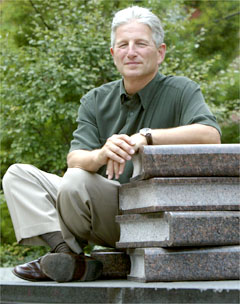
Toronto Bay Street lawyer Ned Levitt. (CP /Frank Gunn)
 Toronto Bay Street lawyer Ned Levitt. (CP /Frank Gunn) |
TORONTO (CP) - On the night of Aug. 30, 1995, a single telephone call sent Toronto lawyer Ned Levitt's stable and orderly life into a horrible tailspin.
It was a policeman calling, asking for a description of his 18-year-old daughter Stacey. Within minutes the kind of trauma and terror every parent fears was coming to pass. Stacey had been out jogging when she was struck by a passing car. She was taken to hospital but succumbed to massive head injuries.
For a man who always needed to be in control of his world, and who enjoyed an especially strong relationship with his daughter, Levitt was plunged into something even more awful than the usual grief and sense of helplessness. Despite assurances that the pain would pass, or at least become more bearable, a year later he felt, if anything, worse.
And that's when he decided he had to do something not just to honour Stacey's memory but to cope with his own mental instability.
Suddenly, it occurred to him.
Before she died, Stacey had wanted dearly to complete a climb up Mexico's Mount Ixta, an experience she had tried once but had to cut short because of bad weather. And so, at nearly 50 years of age, Ned Levitt began to put together an expedition to head to Mexico and to finish that climb.
He chronicles his experience in a new book, No Mountain Too High: A Father's Inspiring Journey Through Grief (ECW Press).
"Everything I did was serendipitous, I had no plan," Levitt explains. "But boy did it feel right to do. That's all I knew."
It then occurred to Levitt that he should not only make the climb, but leave behind a memorial of some sort. Stacey had already proven she was an accomplished poet and her parents had gone to a vanity press to have a collection of her poems printed under the title I Am a Rose, which was the name of a particularly sensitive work she had penned when she was only nine years old.
So at a key climbers' rest stop he left an inscribed box that contained not only a copy of I Am a Rose but pens and a notepad should any passersby decide to leave a message. What he didn't count on was the emotion-charged response from people from all over the world who said they were inspired by Stacey's poetry. (Demand for copies of I Am a Rose has led to a third printing.)
In fact, to this day Levitt continues to receive letters and e-mails from people affected by the power contained in that poetry and in the home-made memorial. Levitt says he never intended to create a shrine to Stacey but that the whole thing took on a life of its own.
"Her death and the pain of losing Stacey is only a very small part of the story," says Levitt.
"There's a theme through the book about the goodness of people, all the people that helped me."
Buoyed by the positive outpouring from strangers touched by their encounter with Stacey's spirit, Levitt has since become active in organizations like Bereaved Jewish Families of Ontario and is a speaker constantly in demand on the issue of coping with bereavement.
"We live in North America in a death-denying culture," he says. "When it comes to death and dying and mourning, we are where we were with sex in the '50s. Nobody talking about it, misconceptions about it."
He concedes that may be a bad analogy but feels the taboo metaphor works in describing our inability to deal with not only death but its grim cousin, palliative care.
And while Levitt doesn't recommend grieving relatives go to the extremes he did, climbing mountains, publishing books and making speeches, he says survivors might want to consider something of their own to memorialize a loved one while creating a catharsis for their own pain.
"You need to build some meaning out of the death, you've got to take some meaning from it," he says.
"Do you know what I've come to realize? The best memorial I'm doing is how I'm living my life, helping people in her name."
Levitt advises parents to do whatever they feel is appropriate, whether it's a memorial fund, a garden or plaque.
"I wasn't a bad person before Stacey died. You're not talking to a reformed alcoholic or gambler. But what it has done, deeply, is changed me from someone who was certainly kind and nice to people, to someone who really connects with people."
Levitt says what isn't spoken about is the fundamental fear of the "second" death of our loved ones, when people begin to forget and stop speaking their names.
"There is the reason for a memorial, to somehow keep their memory alive.
"If it plants a seed, if they see how much it's helped me, then it becomes good for them."
Bay Street lawyer Ned Levitt has chronicled his experiences coming to terms with the death of his teenage daughter Stacey in a new book entitled No Mountain Too High. He says he and many others have gained inspiration from Stacey's poetry, including the first one she ever wrote, when she was only nine years old, entitled I Am a Rose:
I am a rose.
I drink the purest of
waters.
I stand big and tall
in my brand new vase
and when people walk by
they stop and gaze
at my wonderful, yet delicate,
petals of red.
Then they totter off swinging
their heads.
And with a backwards glance,
they run down the aisle
in a skip or a prance!
Stacey said that when she wrote it, she had a vision in her head "that no one can know."